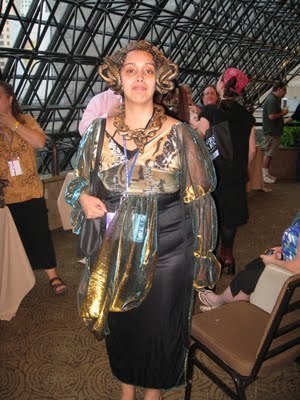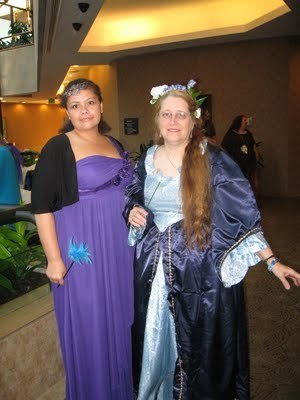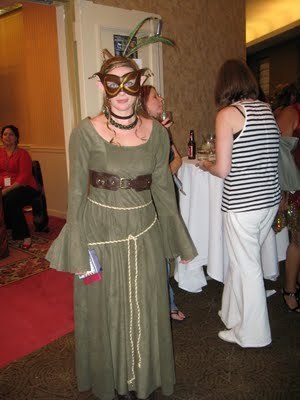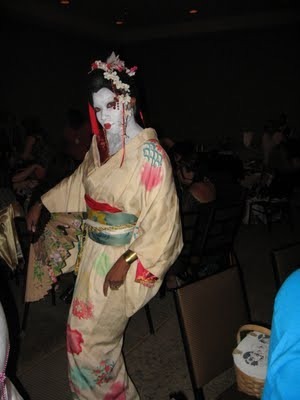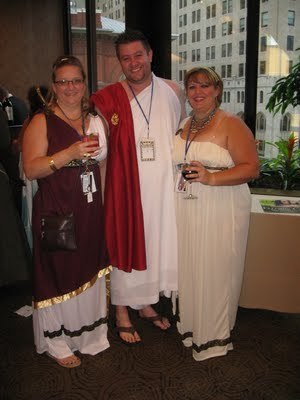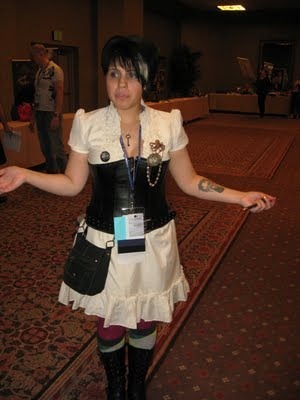C. Margery Kempe's Blog: Lady Smut, page 204
August 22, 2011
Show Versus Tell by Debralee Mede
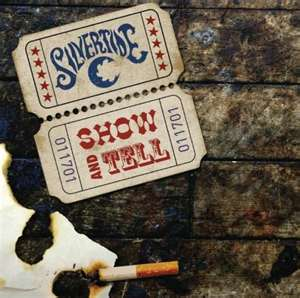 There is a piece of advice that has been repeated to me and others who write. Various teachers have admonished me to be mindful of this even in elementary school. Publishers have also advised me to pay heed with rejection letters that reiterate the phrase: "too much tell and not enough show." I shudder at the thought of hearing it again. Clearly it must be one of the oldest rules in the writing world and one of the rules that I find difficult to grasp.
There is a piece of advice that has been repeated to me and others who write. Various teachers have admonished me to be mindful of this even in elementary school. Publishers have also advised me to pay heed with rejection letters that reiterate the phrase: "too much tell and not enough show." I shudder at the thought of hearing it again. Clearly it must be one of the oldest rules in the writing world and one of the rules that I find difficult to grasp.
This "show versus tell" rule probably dates back to the time when people carved stories on cave walls. Directions probably couldn't be followed by other members of the clan if their pictorials lacked the appropriate inclusions that would describe twists in the road where one might meet the next gruesome animal. Chiefs were known to relate histories to tribal members at the fireside with enough detail so that courage could be engendered in future warriors going into battle.
This writer still finds frustration in reading the words: "Not enough show" on yet another letter of rejection. So what exactly is the difference between these two rules of writing? And why is it so important? At times it is difficult for me to understand and even more to describe but I'll give it a try. When I have reviewed my "temporarily forsaken works" or when other authors shared theirs, I noticed that the missing "show" is somewhat evident and that this missing piece has given me the feeling of being less involved in the material. The story somehow deserted its genuine "story quality", its entertainment value, and had just delivered a dump truck load of information. I felt, in my case, like I was debriefing a congressional committee on a recent skirmish. In my case I felt as if I had managed to shut the reader right out of the story which is not where I want a reader to be.
At times I must say that I wrote a beautiful work of prose but being left out of the action and detail made me feel bored and uninterested. The necessary emotion that would make me faithfully stay to the end of the story was just not there; I didn't get that feeling that I had to know what happened next. The strongly "tell" pieces made me feel like I was getting the story delivered by Detective Joe Friday in Dragnet: "just the facts." When I have been successful at "showing", when the plot was somehow dramatized, then I felt as if I were a participant in the tale. Somehow I became the character, was there with the character or was familiar with the character. I was experiencing the action and was being asked to use all my senses. The book was now alive.
Since then I have found that there are two ways that are the easiest ways for me "show" more in my writing. Granted I am not a seasoned writer but these have worked for me. The first way is through dialogue. It is important to make vivid word choices for characters so that they stand out. If your character is a country singer it is important that the words to his songs sound like a country singer. It is important to choose words that show emotion and with movement with attitude. The reader is like someone who is hearing and visually impaired. So the writer has to describe well enough to make him really hear what is being said and see the way it is being said.
Next I try to find ways to put my characters in situations that highlight their strengths or flaws and that make them stand out or shine. I try to include what makes them distinctive by using strong verbs and detailed description so the character struts his stuff. The character gets to display his unique traits; traits that really make him stand out. So if he happens to be a greedy and unscrupulous physician then I will place him in a situation where he has opportunity and motive so that he can show just how predatory and unprincipled he actually is.
Narrative "tell" scenes tend to be easier to write than a more action packed "show" scene and they do have their place. The more narrative spots tend to allow for emotional breaks than do the "show" scenes. These scenes allow me to prepare and develop upcoming plot points and not every scene needs a detailed description: a four layer chocolate cake is sometimes just a chocolate cake and nothing more. Bite my tongue.
As a writer I am a creator who builds worlds inhabited by would-be people; I build stories where worlds and separate universes are meant to be experienced as if they were real. My goal is to engage and entertain a diverse group of readers. I need to create scenes that my readers can respond to and feel. When it works I find that the pacing of the story is on target; and when it doesn't the story is lack-luster and monotonous. I don't think that I come close to doing enough "show" rather than "tell" and I find that I don't really see where it is needed until I start doing my editing and rewriting. Reading is an enjoyable pastime for me: I enjoy reading a good book and I certainly want to write great ones. Ergo I will continue on my quest for the place where all the secrets to great writing are held. And one day I will grasp that one somewhat elusive concept called "show versus tell".
Filed under: Debralee Mede, How To, romance, Show Vs Tell, Writing








August 21, 2011
Weekly Paranormal-Scope
I have inherited the Paranormal-Scope from Mason. I'm not qualified in any way to read neither stars nor planets. But I am linked into the paranormal in the world.
The week ahead for:
Aries
Robots may be handy, but people make better friends. Spend more time socializing.
Taurus
A leprechaun thinks you're the best. His luck may rub off on you. Use it well.
Gemini
The elusive Spinx is willing to answer some questions. Listen. You will get answers.
Cancer
Be wary of strangers at this time, especially furry ones.
Leo
Pixies are building in your garden. Good fortune smiles on you.
Virgo
Werewolves are howling. Join the pack. It's time for you to shine.
Libra
Lend a hand to a friend in need, and you'll be thanked with more than fairy gold.
Scorpio
Spiders are building a web in your area. Keep your eyes open. Be safe.
Sagittarius
A dragon can be a helpful friend. Behind all that fire is a warm smile.
Capricorn
Shift your heart to accept a new way. Reinvent yourself.
Aquarius
A vampire has crossed your path. Is it love, lust, or just blood that he or she wants? Are you willing to find out?
–Susan
Susan Hanniford Crowley
Filed under: Susan Hanniford Crowley, Weekly Paranormal-Scope








Panic Mode

After the madness of Authors After Dark, there was nothing left for me to do except pack to move to Ireland. This I regard with a great deal of alarm and no shortage of panic. Moving to another country is an exciting idea that makes me very happy, but the reality of sorting, packing and discarding my belongings is a tedious and seemingly endless process that someone of my lazy nature would prefer to avoid.
Why I don't have minions to do this, I don't know!
I've been so panic stricken by the process and trying to organise everything that I forgot to blog today! I can't believe that! It's so difficult to balance things with the pressure of the brevity of time left and the need to write nonetheless. Yesterday while I would normally be writing my blog in leisurely moments, I was sorting out my office which my replacement has to use while I'm gone so I couldn't leave all those papers unfiled, piles of books to deal with and general chaos. I am happy to report that the desk is once more visible and the floor free of papers hastily dropped instead of filed.
But things are less orderly at home and I am tired of all the voices in my head giving me conflicting opinions about what I should be doing first and confusing me >_< which is why I forgot to blog. The sudden realisation that it was Sunday and I ought to have had my post ready to go yesterday at last hit me. Last night, when I meant to do the post, I got distracted by a theme sparking on Twitter that lead to a micro fiction piece which I wrote, polished, debated and then sent off to a contest that I had just been reminded about. Then I worked on another story that's due soon because I was on a roll and all thought of the blog got jettisoned in favour of new idea, shiny.
Hmmm, maybe I need some guest posts for the near future! Volunteers? Meanwhile, I'm going to get back to packing while I watch some of my favourite comedy (the genius Peter Cook) to try to keep me from getting too crazy with panic.
Filed under: C. Margery Kempe, erotic romance, historical romance, Kit Marlowe, medieval, mythology romance, Writer's Life








August 19, 2011
Make It Happen, Watch It Happen or Wonder What Happened by Gerri Brousseau
 I have come to the realization that there are three types of people in life, the"Make It Happen" people, the "Watch It Happen" type and the "Wonder What Happened" group.
I have come to the realization that there are three types of people in life, the"Make It Happen" people, the "Watch It Happen" type and the "Wonder What Happened" group.
Mr. "Make It Happen" has a dream. He knows what he wants to accomplish and where he wants to end up in life. He works daily in the direction of his goal. Mr. Make It Happen knows that the thing he focuses on the most will be drawn into his life. He sees himself living his
dream and draws it to him. Mr. Make It Happen seeks out like minded people and asks questions, picks their brain for ways to achieve his goal. He has faith in his ability. Yes, he fears stepping out and taking a chance, but his dream is greater than his fear so he takes a step of faith. If any of you have ever seen "Indian Jones And The Last Crusade" you may recall the scene where "Indie" stands at the precipice of a great cavern. He sees nothing but a bottomless pit before him. The path he must follow continues on the other side of the gaping cavern, but the gap is a much greater distance than he could ever leap. His father is dying and Indie must get to the Holy Grail to save him. Failure is not an option. The dream or goal in his case is much greater than his fear and so Indie steps out and lo and behold, there was a path there all along, one he simply could not see. Life is much the same. Mr. Make It Happen realized his dream is greater than his fear and although he does not see the path, he is taking the steps forward toward his goal. He is willing to do whatever it takes to achieve his dream. Mr. Make It Happen will see his dream realized.
 Like Mr. Make It Happen, Mr. Watch It Happen also has a dream. He knows what he wants to achieve and where he would like to end up in life. Mr. Watch It Happen will occasionally put aside his TV time to work toward his dream. Like Mr. Make It Happen, he also has the fear of stepping out and taking a chance, but unlike him, Mr. Watch It Happen focuses on his fears and thus empowers them until his fears grow larger than his dream. He decides rather than place himself at risk for failure, he will sit on the sideline of life and do nothing for a while but watch and see what happens. Mr. Watch It Happen does not realize that by focusing on his fear of failing, he is drawing failure to him. Mr. Watch It Happen will not see his dream realized until he finds a way to change his thinking. Unless he can tap into that power and diminish his fears, he will remain on the sidelines of life watching everyone on the playing field realize their dreams and wonder why it's not him.
Like Mr. Make It Happen, Mr. Watch It Happen also has a dream. He knows what he wants to achieve and where he would like to end up in life. Mr. Watch It Happen will occasionally put aside his TV time to work toward his dream. Like Mr. Make It Happen, he also has the fear of stepping out and taking a chance, but unlike him, Mr. Watch It Happen focuses on his fears and thus empowers them until his fears grow larger than his dream. He decides rather than place himself at risk for failure, he will sit on the sideline of life and do nothing for a while but watch and see what happens. Mr. Watch It Happen does not realize that by focusing on his fear of failing, he is drawing failure to him. Mr. Watch It Happen will not see his dream realized until he finds a way to change his thinking. Unless he can tap into that power and diminish his fears, he will remain on the sidelines of life watching everyone on the playing field realize their dreams and wonder why it's not him.
Now we find Mr. Wonder What Happened. Unlike the others, Mr. Wonder What Happened  floats through life with no dream or goal. He is much like a rudderless ship sailing in a current, going wherever life takes him. He's happy in his own little world and doesn't realize he has the power to be whatever he dreams he can be. Mr. Wonder What Happened has no idea there is a playing field, let alone that he can be on it striving to achieve a dream. With no direction he ambles through life thinking Mr. Make It Happen is so lucky and wonders why something wonderful never happens to him.
floats through life with no dream or goal. He is much like a rudderless ship sailing in a current, going wherever life takes him. He's happy in his own little world and doesn't realize he has the power to be whatever he dreams he can be. Mr. Wonder What Happened has no idea there is a playing field, let alone that he can be on it striving to achieve a dream. With no direction he ambles through life thinking Mr. Make It Happen is so lucky and wonders why something wonderful never happens to him.
I ask you which group you fall under. If you are not making it happen, realize by simply changing what you focus on, you can have it all. I encourage you to take that first step and much like Indiana Jones, I'm sure you will begin to see the path laid out before you. Remember, life is a journey and a journey begins by taking the first step.
Gerri Brousseau
Filed under: romance








August 18, 2011
Get Over the Blues
I had a serious case of the blues lately. I went to a completely amazing  convention and got sick. When I got home, I was in such a bad way, that I had to phone my husband from the driveway to help me out of the car. He's a sweetie and came running. I've had a squeaky voice and cough all week and am only now starting to feel better. So you might think I have a right to feel blue.
convention and got sick. When I got home, I was in such a bad way, that I had to phone my husband from the driveway to help me out of the car. He's a sweetie and came running. I've had a squeaky voice and cough all week and am only now starting to feel better. So you might think I have a right to feel blue.
Don't you believe it! Everything in everyone's life can change in a blink. I know all about that. Even though I came home sick, I also came home filled with opportunities to expand my work from networking, filled with joy from people who told me they loved my work, or that they were fans of Nights of Passion blog. I absolutely love that. Writing, editing, making new friends. I love it all and was inspired.
I love blues music too and feel there's two parts to the blues. There's the sadness or tragedy that becomes immortalized in song, then there's the victory in finding out something great, universal, or downright magical. The blues is like a story you can't put down. They both sing.
–Susan
Susan Hanniford Crowley
P.S. I will be doing a free mini workshop "Put Heart into Your Blog" for Savvy Authors.com on Saturday, August 27, 2011. You must register to attend.
http://www.savvyauthors.com/vb/showevent.php?eventid=1215
Filed under: romance, romance novels, Susan Hanniford Crowley, Writer's Life








August 17, 2011
Photos from Authors After Dark
Finding great photos is always a challenge. These photos of the Mythos Ball at Authors After Dark 2011 were taken by Author Rachel Haimowitz.
Thank you, Rachel. Of course, you don't have to be a Greek or Roman God to be divine. I went as Maeve, Celtic Mother Goddess. Juno, Jupiter's bride, brought up constantly that I was a lesser god. (When the Christians went into the British Isles, Maeve was suddenly called Mab, Queen of the Fairies. Oh, well, those are the breaks.) Anyway, we all had a great time. LOL
–Susan
Susan Hanniford Crowley
Filed under: Authors After Dark, Readers Conference, Readers Conferences, romance, romance novels, Susan Hanniford Crowley, Writer's Life








August 16, 2011
One, Two, Three… One, Two, Three
I watched a movie this past week called Shall We Dance? Not the Hollywood version with Richard Gere and Jennifer Lopez but the Japanese version, which is slightly different. Needless to say it was a good movie and fascinating to see the progression of our protagonist through his dancing and his life. Got me thinking about how dancing and music can really mirror the pace of a story. Make sense?
Think Jaws the movie. I bet just by mentioning that, many of you could come up with that goofy song played every time the audience is made to believe the great white is nearby or something is going to happen. I bet it worked for you when you first saw it, am I right? Same thing goes for most movies. Some kind of sinister music for suspense or horror. Mellow music to evoke emotion or calm the audience. Paring music to scenes is an art in itself. Same goes for choosing a pace in our novels.
What? Pace you ask? I know, many times we writers don't even think about it. We just start writing or plotting and you aim to have several points (inciting incident, climax, etc.) but other than that, things just fall into place. Or do they? How many books have you read with sagging middles? Or have you picked up a book and gotten to a really exciting scene and all of a sudden the author is concentrating on the details in the carpet and wallpaper? I have and my first reaction is to either groan or skip through that part until I get to the part I want to know about.
So how do we keep on pace? Most often, I believe it's important to start with a scene. Quite simply, a scene is where something happens in our novel. Many times, authors aim to start books with something exciting and captivating. Whatever you choose, you want your readers to be hooked and keep reading. Following a scene or scenes, we have sequels. Sequels are parts of our books where our protagonists, villains, etc. get to contemplate what happened, or where we as authors try to create an emotion about what just occurred. A very simple pace for a book would be scene-sequel-scene-sequel… I've found this works great for shorter works but can be more difficult to sustain with longer works. A longer work might require a couple sequels between each scene or if the novel is action packed, you may have more scenes and fewer sequels.
Either way, we as authors set the pace throughout our novels. Areas of the novels with more action or drama may require more scenes whereas areas with less action may require more sequels. Whatever you decide, make sure it is a pace or rhythm which will keep your readers on track. The last thing you want is a novel so action packed you make your reader dizzy or vice versa, your reader starts snoozing a third of the way through.
So back to that drawing board and setting your pace. Believe me, your readers will be all the happier for it. Happy writing and good luck!
Filed under: Toni Kelly, Writer's Life, Writing Topics








August 15, 2011
I Think I Have a Bad Case of "Whatchamacallit"
Imagine this: A most evil, malignant and immortal wizard who throughout his villainous reign has plagued some with fear by acting like a "raging psychopath and sadist deriving pure amusement by inflicting pain on others." He does so without remorse: "killing Muses, oh, I mean Muggles, just for fun." Now is this J.K. Rowling's Voldemort or is it someone else. Is there another atrocity lurking about waiting to destroy Muggles, I mean Muses? What or who is it that attempts to consume the genius and imagination of his victims by temporarily restraining them? What or who ultimately destroys the inner muse so that his writer is consumed by an inability to work leading to his abandonment of his career? 
Okay so I am speaking of Writer's Block, or the character in the Harry Potter series known as Voldemort? But like the character in the Rowling series, this annoyance should also go unnamed. This, like Voldemort, is "He-Who-Must-Not-Be-Named" because naming it makes it more real, gives it more power and then makes it come to life. Like a child saying that he has a tooth ache in order to avoid going to school he may come to believe that he has a toothache. Once at the dentist though a miracle occurs: he no longer has pain and can't even remember which tooth was painful.
Now I admit, that there are things that I don't like to do and that I find myself digging in my heals in so that I can avoid doing them. Spring cleaning is one but I can't recall a "spring-cleaning-block." There are times when I have not wanted to get up and go to work but I have not called in and said: "I will not be in today because I have "work-block" or "boss-block". Though I really would have liked to do that but you get the idea. The "term-that-shall-not-be-named" is too general because there are many causes for its existence. It's like saying that you have stomach ache because there are too many causes for this ailment to call it just a stomach ache. So it's time to start demolishing the building of resistance that we construct for ourselves, block by block, and find a way to deal with the detour to our dreams.
Some causes for this malicious malady include: a biochemical problem causing misfiring in the person's brain chemistry (yes, there are studies being done on this); a writer just not being ready to write due to unforeseen circumstances like a health issue; a writer trying to compose the work mentally without writing new ideas on paper and then forgetting; a writer feeling like they have to be perfect; a writer fearing that their current work will be the last they can ever produce; and a writer accepting undue and excessive criticism about their writing. Some ways that they express this include: struggling to find topics to write about; struggling to make time to write; they may self-edit excessively or just stop writing all together.
Now for the cures, but remember these are some tat have worked for me. There are many. Just keep trying until you find what works for you. A good deal of my ideas have come from two books that you can get easily at a bookstore or local library: Steven King's "On Writing" and Julia Cameron's "The Artist's Way." Cameron's book is very helpful especially with what she calls "morning pages." She says that it is important to get three handwritten pages done every morning no matter how you feel. By writing these pages first thing in the morning the writer can quiet their "inner censors" and instead, allow the "inner child to shine." She says that when the writer is able to reach their own quiet center, and go past the censor's production of fear and negativity, they will arrive at the place of their triumphant selves. (p12) What is interesting is that by doing this I find that I also manage to keep my promise to myself to keep on writing. I also have saved these pages and have returned to them later finding material for future works.
Steven King's book "On Writing" is an excellent help for writers especially in this area. The ones that I refer to the most are:Showing up; Keeping the door shut; Work Consistently/Write and Read a Lot; Don't Care Too Much About What Others May Think; and finally Remember Why You Started To Write in the First Place.
Showing up: establish a writing schedule you can stick with: King links writing to any job done by a craftsman, laborer. "Our work involves creating and building stories, poems or plays like a bricklayer puts down bricks. The bricklayer uses mortar and bricks to build his structure and we use words one beside the other to create our work. " Just as a laborer has to show up for work, so does the writer: everyday, on schedule, to complete something tangible.
Keeping the door shut: Find a space you will enjoy being in, be sure it is well-lit, quiet enough; and be sure the door is closed to minimize interruptions. King says that he plays loud rock music and then he can't hear the distractions. He does this while he is doing his first draft but the door is open with his final draft because "once you know what the story is and get it right — as right as you can, anyway — it belongs to anyone who wants to read it. Or criticize it."
Work Consistently: Establish your working hours or parameters. King suggests 1000 words per day or 4 hours per day; just stick to it and don't get up off the chair until it's done.
Write A Lot: King says that in order to become a better writer you need to write more and more. He says that waiting for inspiration can be a long wait so just write whatever comes into your mind about the story. Rewrites will come later. Just write.
Read A Lot: He says that when you read you pick up things which might be reminders of what you should be doing or should avoid doing. It broadens and deepens your knowledge. King says that you can read in waiting rooms, treadmills and the bathroom. Still no time: King says that he listens to several audio books in a year.
Don't Care Too Much About What Others May Think: King says that if you listen too much to your critics you won't get much done. Your writing will become worthless and will not be the truth: your truth. If it is not your truth then your reliability will go down with your writing and for your reader.
Remember Why You Started To Write In The First Place: you need to touch base with why you love writing. "Writing isn't about making money, getting famous, getting dates, getting laid or making friends. In the end, it's about enriching the lives of those who will read your work, and enrich your own life, as well. It's about getting up, getting well, and getting over. Getting happy, okay? Getting happy."
There is one more suggestion that I have. I have used this website and technique before when I experience a cessation in writing: Dr. Wicked's Write or Die website at http://writeordie.com/and write quickly for a set time. The website is free, fun, and this kind of writing in particular is sure to cure you of the writing doldrums at the very least. Like free-writing and Cameron's morning pages, this site is a good way of squashing your censor and give your creativity "a thorough dusting."
So whether you are a Harry Potter fan or not, or you call this Voldemort, the Muse-Killer or anything else you chose, one thing for sure is that you have more than likely experienced this "You-Know-Who" in your writing life. Drag out your Invisibility Cloak, Resurrection Stone and Elder Wand or try a few of these; either way destroy the evil wizard lurking over your writing who is trying to destroy your muse, your dreams and get writing.
Debralee Mede
My question: Have you tried any of these techniques? How have they worked for you? What does work for you?
Filed under: beating writer's block, creative writing, Debralee Mede, editing, fear, goals, Helping Other Writers, Recommended Books, Writer's Life, writer's block 







August 14, 2011
Weekly Paranormal-Scope
I have inherited the Paranormal-Scope from Mason. I'm not qualified in any way to read neither stars nor planets. But I am linked into the paranormal in the world.
The week ahead for:
Aries
Medusa has an awesome hairstyle. Don't knock it unless you've tried it.
Taurus
A siren sings for you. It's time to forget the past, but keep your goals in focus.
Gemini
Werewolves are howling outside your door. Go join them.
Cancer
An outing is exactly what you need. Shapeshifters can improve the experience.
Leo
Are you feeling lucky, Lion? A leprechaun is around the corner.
Virgo
A vampire for a friend is not a bad thing. It's when they lick your neck that you need to set some boundaries.
Libra
Support your Yeti. An abominable snowman can come in handy in the tough times.
Scorpio
The fae have blessed you this week with an abundance of joy.
Sagittarius
The local centaurs are throwing a party and you're invited. Don't forget to bring a housewarming gift.
Capricorn
Pixies have built a village in your garden. Enjoy it.
Aquarius
Dragons can roast marshmallows. All your friends have talents.
–Susan
Susan Hanniford Crowley
Filed under: romance








August 13, 2011
Authors After Dark in Pictures




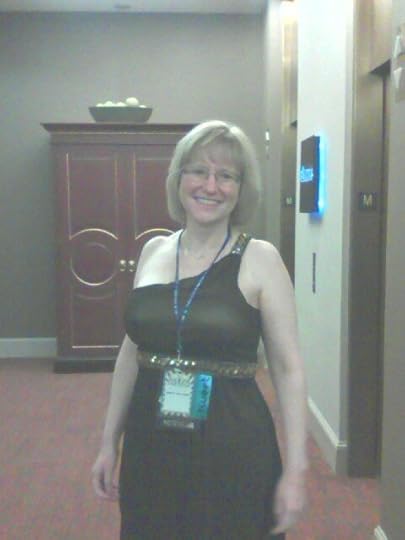

Filed under: a.c. Mason, Authors After Dark, C. Margery Kempe, erotic romance, Kit Marlowe, paranormal romance, romance, Susan Hanniford Crowley, Writers Conferences








Lady Smut
...more
- C. Margery Kempe's profile
- 52 followers


